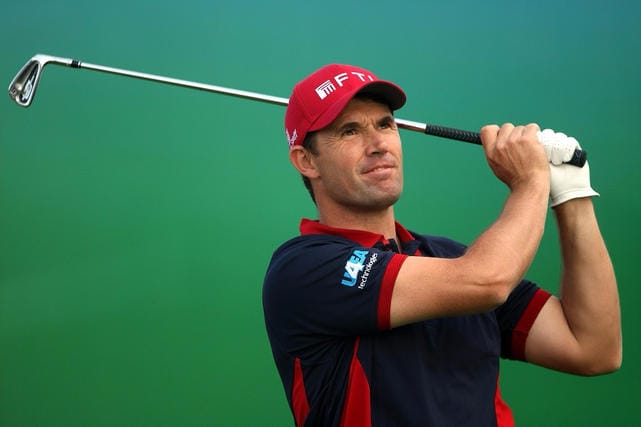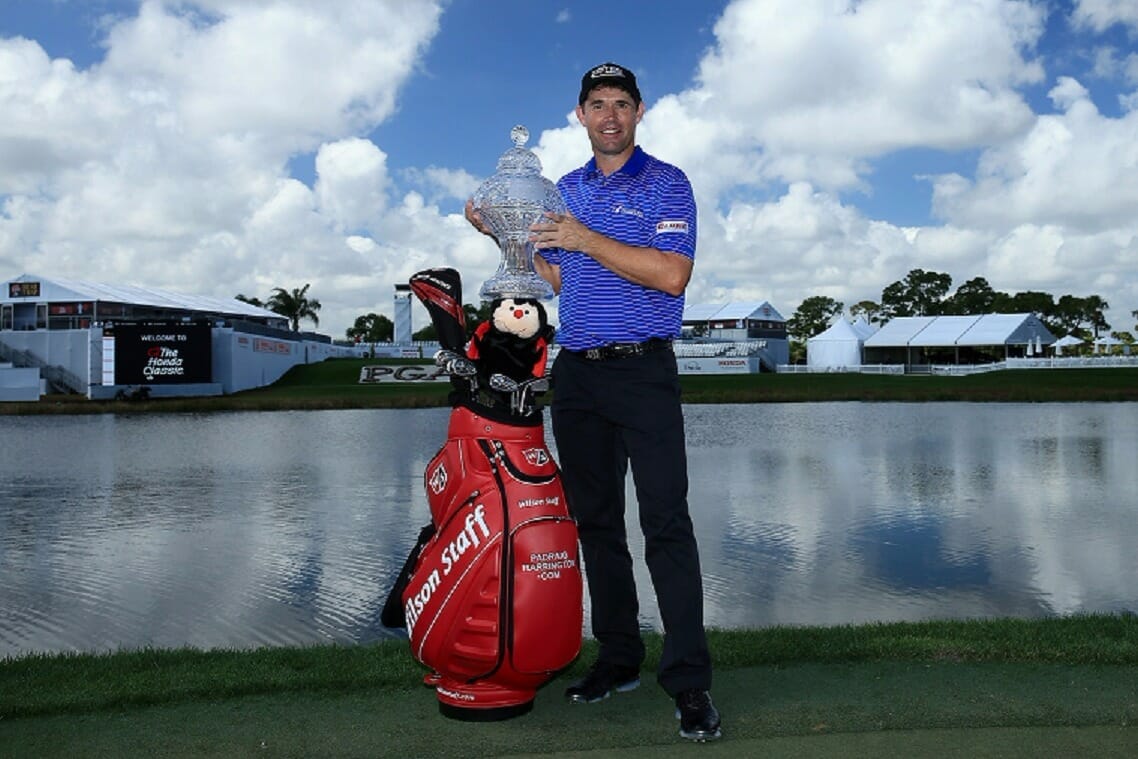In February IGM’s Paul Gallagher caught up with Padraig Harrington to chat about his 18-year association with Wilson Golf. If you haven’t read it yet, you really should.
Write the questions down, add the supplementaries and build the mind map to plot the journey for the next 90 minutes. Then quickly crumple the crisp piece of A4 and discard immediately before speaking to three-time Major champion Pádraig Harrington.
Harrington is as fascinating as he is mesmerising; it takes a period of debrief to work out exactly what has been said. “There is gold in them there hills” but sometimes unearthing the nuggets is not immediately obvious.
As for trying to set the agenda and lead Harrington to every area of ink spilled on that crumpled parchment, forget about it. Instead, seek out prime moments for forthright interjection and suddenly we have a flow, a much richer flow.
On this rare occasion, however, praise be for the transcribe session to evaluate what we have.
Harrington himself is gold; he converses affably yet he won’t know me like he knows a Mulqueen, Gilleece, Reid or a MacGinty. And his dry wit is never far away.
We’re here on the premise of talking about his 18-year affinity with equipment manufacturers Wilson Staff. It’s a relationship that cuts both ways, of mutual respect and is most definitely mutually beneficial. It’s still evolving, but most importantly it’s still delivering.
One week before teeing it up in the 2016 Portugal Masters, Harrington put the new Wilson FG Tour V6 irons in the bag and duly racked up his 15th European Tour win, 31st in all. “Great timing, first week in the bag. Sure, you get a little bit of a honeymoon effect when new clubs go in the bag,” enthuses Harrington. “They’re a beautiful set of clubs and they perform. What more can you ask for?”
With maturity, the 45-year-old is no longer considered one of the tour’s range rats but he is most definitely one of golf’s most curious campaigners. R&D (Research and Development) is his thing and not having access to the latest toys instills fear in an individual whose competitive instinct remains as sharp as ever.
“There’s no doubt Wilson suits me, it’s solid. It’s my sort of brand. It’s reliable, dependable, you know what you are getting with Wilson. In fairness, they also have the technology, but they don’t try and do silly things. They are very much like me, solid and dependable,” says Harrington after 18 years with Wilson and he has re-signed a new deal for next year.
Flexibility is key in this long-standing relationship. “I simply wouldn’t be able to handle it if someone else out there had something better than me. The minute something new comes out, I’ll try it, test it and find out all I can about it.”
Candidly Harrington shed more light on the open nature of his clubmakers. “Wilson have always said to all their players ‘Look, we want you to play the best equipment for you, if you find something else that helps you perform, go use that, then give us a chance’. That’s a commitment Wilson have always made to me, that trust is very important.”
And for the man on first name terms with every Wilson designer and engineer, the view is simple. “There’s only two ways to manage R&D; either be oblivious or be assured there’s nothing else out there.”
“We’re pretty much joined at the hip, no doubt about it. I’m synonymous with Wilson. I’m part of the brand at this moment in time,” adds Harrington of the manufacturer with the most Major wins in men’s golf (61 as it stands). Granted, Harrington was last to add to that tally in 2008.
Another of Harrington’s enduring relationship is with his caddy Ronan Flood. They’ve been through the heat of battle together since 2004 when the accomplished two-handicapper gave up his job in banking. “Ronan is my caddie but he’s also my best friend.” It’s suggested he would say that for he’s also Harrington’s brother-in-law. “Yeah, but I knew Ronan before all that,” quips Harrington quick as a flash.
These days that friendship and bond is just as important to ease the loneliness and monotony of tour life – especially in The States – as it is dealing with pressure coming down the stretch.
“I don’t find it as easy playing a Thursday, Friday or Saturday anymore but if I get into contention on a Sunday I can read the situation well and often perform. I don’t get up there as much as I used but I can get it done when I do.
“Ronan is the one who watches the scoreboards. If I need to be filled in, he will let me know. There will be a discussion, you must talk it through with your caddy. So many ways to win and lose. If I have momentum, you keep going. If nothing is happening you change tactics, but I will have a strategy worked out for that the night before,” says Harrington revealing some more of that analytical mind.
He became most poignant when recalling the 2006 US Open. “I learned so much from Winged Foot. I lost that tournament, believe it or not, because I hit too many fairways and greens for 15 holes. I never played golf like it, best I’d ever hit it. But then when I missed the green at 16 and made bogey I pressed too hard, hadn’t had to chip all day.”
“But that was a key moment. It was the first time I walked away from a Major and said to myself I am good enough to win one of these. Up to that point I thought I could only win if everything went for me.”

What Harrington describes is the cauldron of pressure. In his view, you either put yourself out there and thrive on it or you’re better off staying well away and not annoying yourself. For us mere mortals we will never know what it’s like to run out onto the hallowed turf at Croke Park, to walk inside the ropes at manicured Augusta or stride down the 18th at an Open Championship.
They are places of privilege but also playgrounds that demand performance. There is no hiding place.
“I’m not looking to hang onto secrets anymore,” say Harrington. “A few of the younger guys will ask me things and I’m happy to talk it through with them. The key here is every time I lose I want more if it. I want to put my neck on the line again and again because every time I’m learning.”
“A young player came to me after missing a four-footer on 18 and I said were you nervous? I said I can sort that and make sure you never feel nervous in that situation again. He was expecting the magic bullet, but I simply say ‘never get into contention again’.”
“The point I make is there are many pros who don’t like the feeling of failing, so they fail much earlier and therefore never get put in the spotlight. I am happy to make a mess of it on 18, I just want a chance of messing it up on 18 on a Sunday afternoon.”
And what you’re feeling, how is that different to trying to win a Sunday medal?
“Same pressure. I feel exactly the same pressure. Whatever you feel trying to win the Captain’s prize is the same as me trying to win a Major. Process is the number one way of dealing with it, but you must also have an expectation of what’s going to happen. To become nervous is normal.”
“If I get nervous, it’s a red flag that goes up in my brain that tells me, I’m exactly where I want to be. I want to be nervous every Sunday for the rest of the year. And it’s pure numbers, like tossing a coin. I think if I lose one then I’ll win the next one. Maybe that’s the accountant in me, or maybe it’s the gambler.”
Closer to home Harrington has his own view on the struggles of some of the young, aspiring professionals trying to make their mark in the paid ranks. He insists players must feel comfortable on tour and that’s where people like Paul Dunne benefitted greatly from making his mark as an amateur on the pro scene when he almost lived the dream in the 2015 Open Championship at St Andrews.
“Most guys are trying to step up a level when they should be staying the same, play their ‘normal’ game and soon enough you will find out if that game is good enough,” says Harrington. “The anticipation of ‘I’m a pro now, I need to do better, need to practice more’ can get in the way at the start of a young career, whereas you just need to go and play.”
Taking a step back, Harrington would prefer to see a player regularly shoot low scores on an easier course than shoot 72s on a tough course “because the professional game is all about shooting good scores”.
He acknowledges golf is in a completely different place today than when he started his pro career over two decades ago in 1995.
“There were 14 Irish guys on tour when I came out, whereas a nation like France maybe only had one or two players, now it’s the other way around. There are less spots for the Irish lads with many more Continentals playing and competing.”
“Countries have systems and systems always produce average. It’s the genius that fights the system. Sweden always had great systems, the likes of (Jesper) Parnevik or (Freddie) Jacobsen always fought the system but they only got their first Major champion last year.”
“I think the Irish system is good, the problem in Ireland is other nation systems have improved so there is less room for us in the world of golf.”
“We have produced at the top and this is undoubtedly a golden period. There’s no doubt having four players who have won Majors is an outlier at the moment and hard to live up to. But I don’t think us winning Majors has become prohibitive (too much to live up too). The reverse in fact, I think me winning showed a lot of people that it was possible to win one of these things.”
“Ireland has a very competitive golf environment which I think is brilliant at producing hard, competitive golfers. Competitiveness is hugely important but amateurs looking to turn pro really have to dominate and be hungry. When I turned pro I had hardly lost a strokeplay event in 18 months. I won 10 scratch cups in one year. I was the number one amateur in Ireland for three or four years. I was dominant, there to be shot down, that’s where I think we might have an issue.”
“Never mind the championships, I played everywhere. I pitched up at the Alliances, I was there to make money and win. I went with purpose because in my view if I was going to make it as a pro I had to beat everyone every day.”
Harrington is also acutely aware there are different routes into the pro game, no one template. “The four of us who have won Majors all had different paths. I was certainly an amateur through and through, I think Shane (Lowry) has had a similar path to me. Rory (McIlroy) travelled the world at a young age, Graeme (McDowell) went to college in the States and Darren (Clarke) was a big star, he was a class apart as an amateur. He had the big swing, the look, everything about him.”
If these are some of the challenges facing young Irish professionals where does technology play a part?
“Technology definitely improves the standard of play but I think there is much greater depth of players coming out on tour with more knowledge. I never had a lesson until I was 16, I hadn’t a clue what a swing plane was. Now with YouTube and TrackMan and whatever else is out there; every player has the knowledge and the tools, plus there are more athletes playing the game,” says Harrington.
“Go back to Jack Nicklaus’ day, essentially the only people who played golf were rejects from other sports. If you were big enough and good enough for basketball, football, baseball or the athletics programme that’s what you did. You only played golf if you were a reject.”
“When Robert Karlsson (6ft 5in) played in The States two years ago, he didn’t look tall like he used to. The guys now are all big, strong and athletic, the difference is they are now choosing golf. In my era, Tiger changed golf to a power game from a more finesse game.”
Harrington is as pragmatic as he is passionate. He is an individual comfortable in his own skin and who knows his worth. What has been achieved in the last two decades and more has allowed him to make his own choices. His approach to tournaments is completely different to that heavier set journeyman who started out under a wide-brimmed Wilson visor.
“My perspective on tour in the last two, three years has really changed. I’ve realised as I get older I need more activity away from the golf course. The experience must be enjoyable, I’m too old to be making it a grind. I looked for the hotel five minutes from the course 10 years ago, now I want the hotel 40 minutes away in the city.”
“That’s where Ronan is invaluable. I don’t think I could manage tour life without his friendship away from the fairways. When I came back to compete in Europe I always enjoyed tournament weeks when Peter Lawrie and Damien McGrane where playing. Those weeks were so much fun, I grew up with these guys, we could talk, we were on the same page.”
Harrington add that his wife Caroline now goes to around a dozen tournaments a year and their two sons maybe eight outside of school. “And believe me, it’s only the good ones, it’s all about the good venues, the good hotels! If you were to follow my wife’s itinerary you would know exactly the best stop-offs on tour,” quips the three-time Major champion preparing to get those tour spikes on once more.
“I feel in a very good place mentally. I’ve got my short game back and I’m putting really well. The only niggling concern is I got injured in Rio last year, think I trapped a nerve and sometimes that causes a sporadic loss of speed. I don’t do short hitting very well, it’s not in my character.”
“I’m seriously optimistic. I’m back in the attitude that the game is well within me. Stay fit and I am in a comfort zone which is where I want to be,” said Harrington plotting a five–week tournament run and a route into the Majors starting with the Masters in April.
Could we really be talking about Harrington winning another Major? If so, he needs back into the world top 50 – and quickly. That would surely be time for more scribbled notes and crumpled paper.























Leave a comment